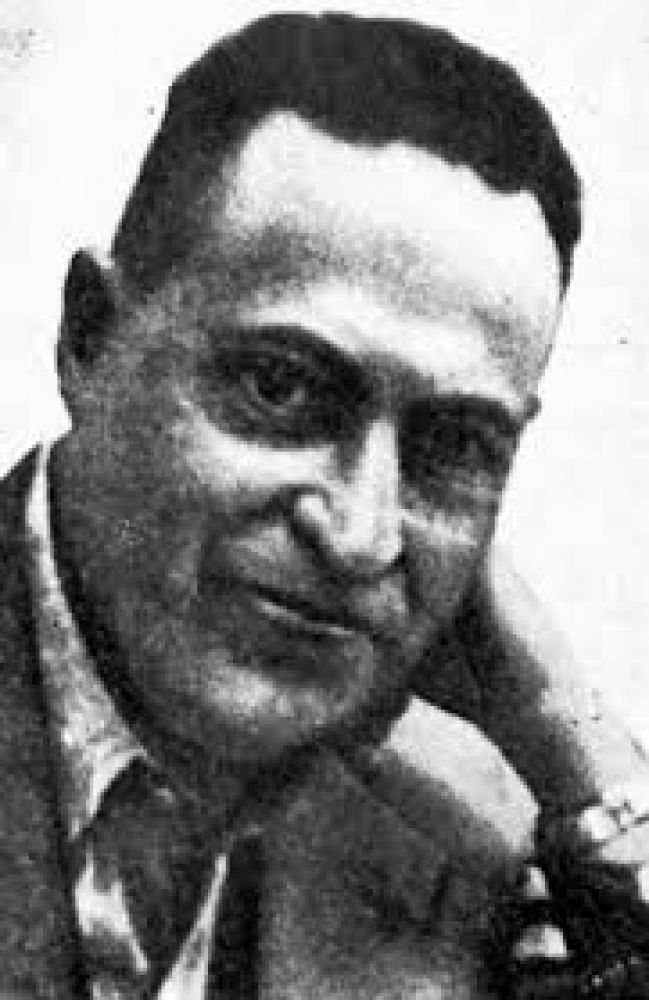- News
- Events
- Oneg Shabbat
- Collections
- Research
- Exhibitions
- Education
- Publishing Department
- Genealogy
- About the Institute
- Bookstore


Eliezer Lipe Bloch, photo courtesy of Ghetto Fighters' House, Israel
Eliezer Lipe Bloch (Lejzer Bloch, Lipe Lejzer Bloch) was born in 1888 or 1889 in Uman in Podolia. Before World War II, he was leading the General Zionists party and Keren Kayemet – the Jewish National Fund, which collected financial means for the colonization of Palestine through purchasing farmland. He was co-directing Tarbut – a network of Zionist schools which were teaching in Hebrew. He was also known as an outstanding speaker, with a vast knowledge of Jewish history. In Warsaw, Bloch shared an apartment with his wife and daughter Estera in a tenement house (now non-existent) at 19/20 Leszno street, near the Great Synagogue.
In the Warsaw Ghetto, Bloch was active in the clothing department of Jewish Social Self-Help – an organization which helped the poorest and offered the Jewish intelligentsia a chance to survive. [1] There, he met Emanuel Ringelblum, who invited him to join Oneg Shabbat. According to Hersz Wasser, Bloch participated in the initial meeting of the group in the autumn of 1940, in Ringelblum’s apartment at 18 Leszno street.
![list od ELB ARG II 480_34.jpg [601.96 KB]](https://www.jhi.pl/storage/image/core_files/2022/3/24/3bacc6a3020762cc8623ea4515d29f6a/jpg/jhi/preview/list%20od%20ELB%20ARG%20II%20480_34.jpg)
As a talented and experienced social activist, he engaged himself mostly in developing the concept of Oneg Shabbat. He didn’t work independently on documents for the Ringelblum Archive, aside from several papers regarding the work of the Jewish Social Self-Help in the ghetto.
Bloch and Ringelblum quickly became friends. Along with Menachem Linder, they established an editorial committee which began works on Two and a half years of war at the beginning of 1942. Bloch was supposed to work on part four, dedicated to social aid. [2]
After the Great Deportation in the Summer of 1942, when 265,000 Warsaw Jews were sent to Treblinka, 21-year old Estera Bloch, Eliezer’s daughter and youth resistance activist, was killed; she left the ghetto with a group of friends and headed towards a partisan base in Werbkowice near Hrubieszów. They were arrested on the train and shot. [3] At the time, Ringelblum was certain – as Samuel Kassow writes – that everyone else left in the ghetto is actually sentenced to death. [4] Along with Bloch, they established an organization supporting starving carpenters, employees of the Bernard Hallman’s workshop at 66 Nowolipki street. Moreover, the workshop was located right next to the old Borokhov school (68 Nowolipki street), where Izrael Lichtensztajn hid the first part of the Ringelblum Archive in the basement. [5] Ringelblum hoped that the work card from the workshop would guarantee security for him and his family. Together with Bloch, they were collecting information about life in the ghetto from Jewish beggars, at the same time providing them with money, food and clothing, worth over 50,000 zloty. [6]
![bloch_4.jpg [115.98 KB]](https://www.jhi.pl/storage/image/core_files/2022/3/24/dc8a2a2ea89ce05c3d83beb9288d59d7/jpg/jhi/preview/bloch_4.jpg)
In the autumn of 1942, following the Great Deportation, the general mood in the ghetto changed. Several members of Oneg Shabbat – Ringelblum, Bloch, Yitzhak Giterman, Menakhem Kon, Shmuel Winter and Alexander Landau – joined the financial committee of the Jewish Combat Organization (ŻOB), intending to collect money to buy arms. The insurgents were concerned that – as Zivia Lubetkin recalled – if we won’t do anything, the entire Jewish population in Poland will be murdered without one gunshot. [7] Even though Ringelblum and Bloch didn’t use such radical methods as those ŻOB fighters who threatened rich Jews with death unless they provided financial support, Shmuel Winter claimed that they had donated a significant amount of money. [8]
During the Warsaw Ghetto Uprising, Bloch was arrested by the Germans and sent to a labour camp in Budzyń near Lublin. Even though Adolf Berman offered him help in escaping, Bloch refused, because with 15 other Jews (including the outstanding Warsaw rabbi Kalman Kalonimus Szapiro, whose sermons are preserved in the Ringelblum Archive) he made a vow that regardless of circumstances, they will remain together. [9]
Eventually, the Germans had sent Bloch to concentration camps in Kraśnik and Płaszów, and in August 1944 – to Mauthausen in Austria, where he died in unknown circumstances.
Written by: Przemysław Batorski
Translated by: Olga Drenda
Footnotes:
[1] Samuel D. Kassow, Kto napisze naszą historię?, transl. Grażyna Waluga, Olga Zienkiewicz, Jewish Historical Institute, Warsaw 2017, p. 219-220.
[2] Archiwum Ringelbluma, vol. 11, Ludzie i prace „Oneg Szabat”, ed. Aleksandra Bańkowska, Tadeusz Epsztein, Warsaw University Press, Warsaw 2013, p. L.
[3] Cywia Lubetkin, Zagłada i powstanie, transl. Maria Krych, Jewish Historical Institute Press – Science and Research Institute/Książka i Wiedza, Warsaw 1999, p. 162.
[4] S. Kassow, op. cit., p. 564.
[5] Ibid., p. 556.
[6] Ibid., s. 564, 582-583.
[7] C. Lubetkin, op. cit., p. 70.
[8] S. Kassow, op. cit., p. 582-583.
[9] Ibid., p. 289-290.
Bibliography:
Archiwum Ringelbluma, vol. 11, Ludzie i prace „Oneg Szabat”, ed. Aleksandra Bańkowska, Tadeusz Epsztein, Warsaw University Press, Warsaw 2013.
Samuel D. Kassow, Kto napisze naszą historię? [Who Will Write Our History?], transl. Grażyna Waluga, Olga Zienkiewicz, Jewish Historical Institute Press, Warsaw 2017.
Cywia Lubetkin, Zagłada i powstanie, transl. Maria Krych, Jewish Historical Institute Press – Institute for Science and Research/Książka i Wiedza, Warsaw 1999